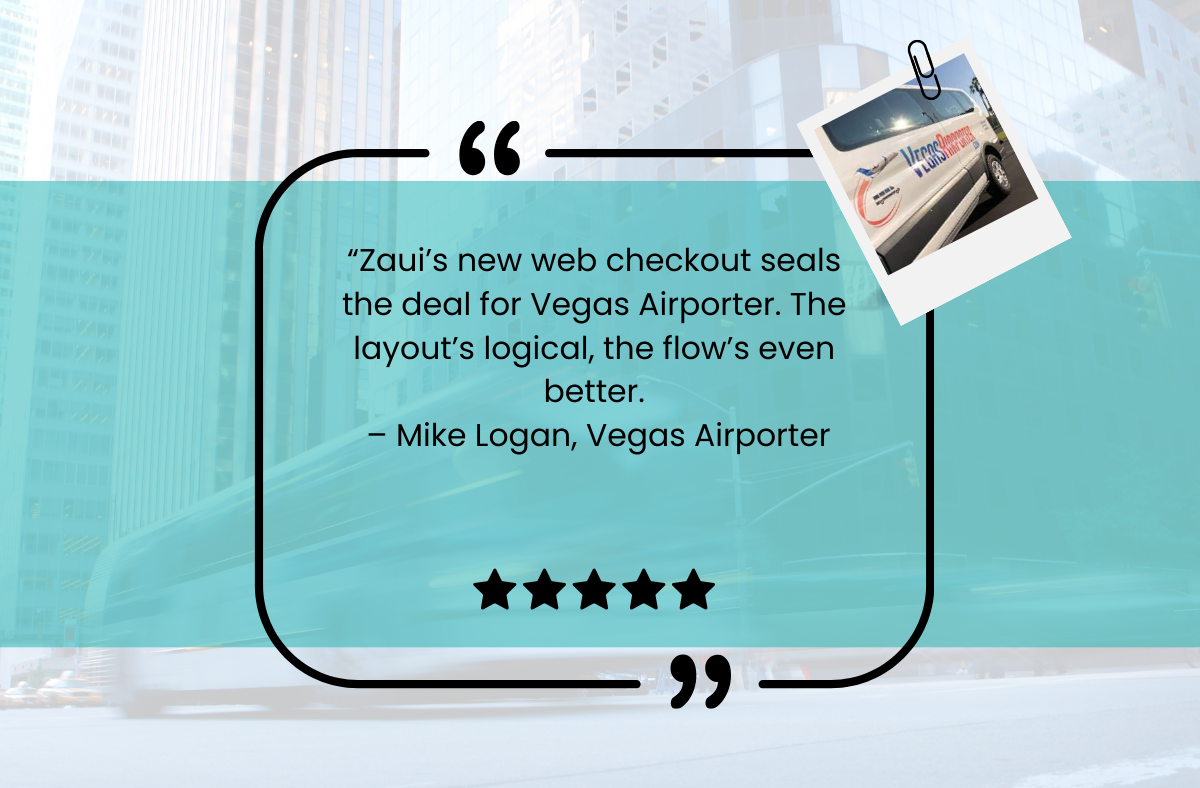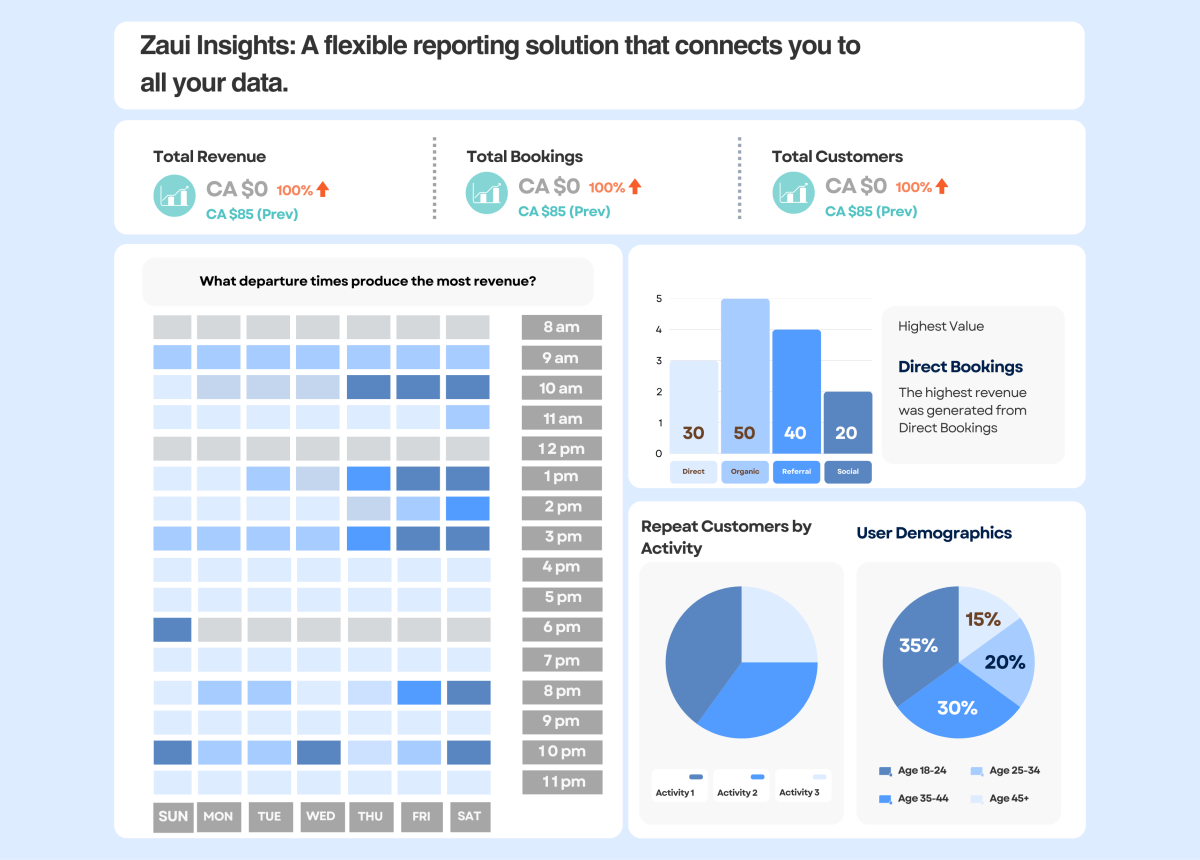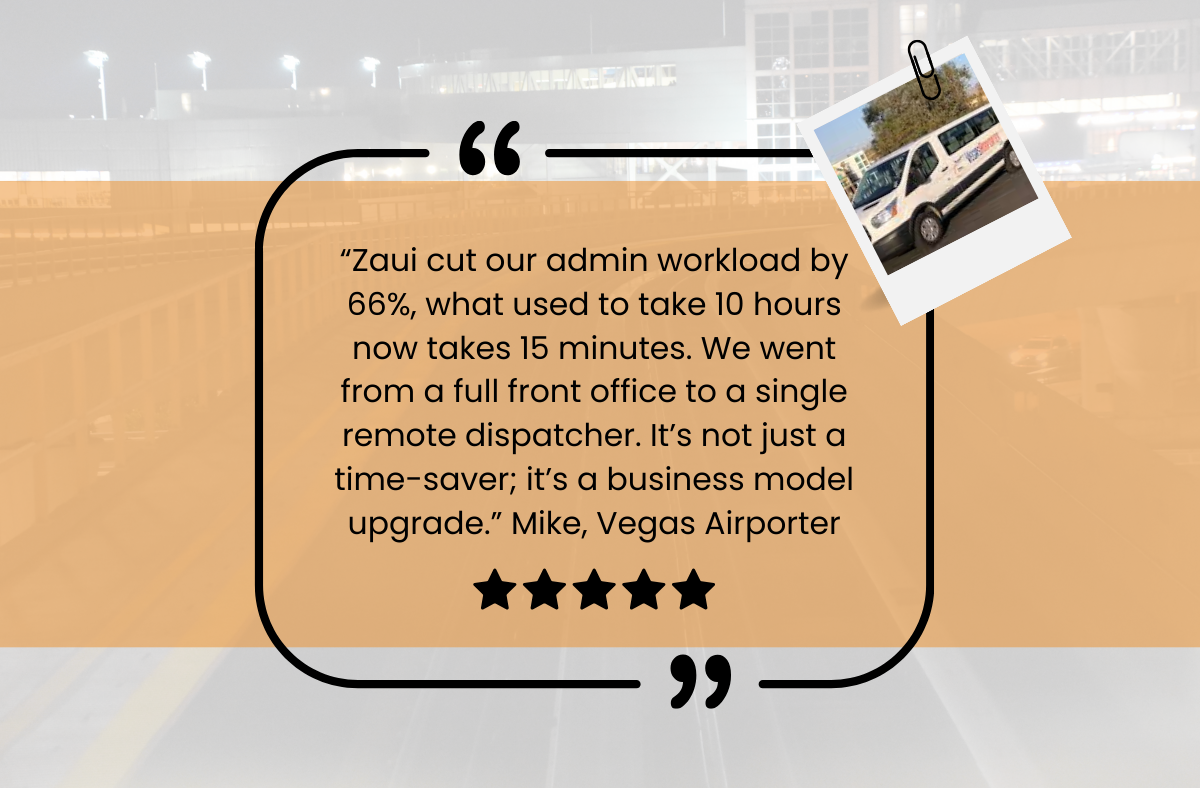What to Look for in a Travel Booking Software in 2026

Must-Have Features to Look for in a Travel Booking Software in 2026
The travel industry is rebounding and evolving rapidly in 2026, bringing new opportunities and challenges for tour operators, travel agencies, transportation providers, and other travel companies. Having the right travel booking software is crucial for streamlining your travel business. Your travel booking software acts as a central hub to manage reservations, inventory, and customer interactions across channels, ultimately delivering a seamless booking experience to your customers as well giving you tools to manage your bookings and to optimize your revenue and operations. The Travel industry is entering 2026 with steady momentum, with total gross bookings projected to reach $1.67 trillion. Businesses need advanced tools to handle the volume and complexity of bookings. In this blog, we'll explore the emerging travel booking software trends of 2026 and the must-have features and functionalities you should look for in a travel booking solution. We’ll also see why Zaui stands out as the best-in-class option for tour, activity, and transportation providers this year.
Understanding Travel Booking Software Platforms
Before evaluating trends or feature sets, it’s important to understand what travel booking software actually is and how it functions at the core of a travel business. Travel booking software platforms are specialized systems designed to manage how bookings are created, priced, confirmed, and fulfilled across services like tours, activities, transportation, and rentals. These platforms replace fragmented tools and manual workflows by centralizing availability, inventory, payments, and customer information in one system. Modern travel booking software typically provides real-time availability and pricing, secure payment processing, and booking management tools that support modifications, cancellations, and automated communication.
Some platforms are built to support a wide range of travel businesses, while others are purpose-built for specific segments such as tours, activities, or ground transportation, offering more specialized operational features. Understanding this distinction helps travel businesses choose software that not only supports bookings today but also aligns with their operational needs and growth plans heading into 2026.
Travel Booking Trends and Industry Outlook for 2026
The year 2026 brings a dynamic landscape for the travel industry. Understanding the trends shaping travel and technology will help you identify what features matter most in a travel booking system. Here are some key trends and factors influencing travel booking software requirements in 2026:
- Resurgence of Travel & Tourism: Leisure and business travel continue to surge, with global tourism volumes now exceeding pre-2020 levels. Pent-up demand and growing traveler confidence have pushed international tourist arrivals about 3% above 2019 numbers as of late 2025. Business travel is also rebounding steadily, global corporate travel spending reached an estimated $1.48 trillion in 2024 and is forecast to hit $1.6+ trillion by 2026. This renewed growth underscores how significant corporate travel has become again. For travel businesses, this means your booking software must scale with rising volume and accommodate all travel segments (tours, activities, transportation, accommodations) to capture the demand.
- Rise of Personalization & AI: Travellers today expect tailored experiences and intelligent recommendations. Personalization has become a major differentiator, from customized itineraries to targeted add-ons, and travel technology is increasingly leveraging artificial intelligence (AI) to deliver it. AI usage in trip planning doubled over the past year and is accelerating into 2026. Hotels and travel platforms are rolling out AI-powered chat assistants and dynamic pricing engines that can suggest relevant options or build itineraries on the fly. Major online travel agencies have even integrated generative AI (like ChatGPT) to help travelers plan and book trips via conversational prompts. Travelers are growing comfortable with these tools; for example, 61% of travelers find AI helpful for trip planning. Automation also remains crucial behind the scenes from automated confirmation emails and chatbots handling common questions, to algorithms that assign resources (guides, vehicles, rooms) efficiently. In short, nearly every travel company is exploring AI to enhance personalization and streamline operations, and your booking software should be “AI-ready” to keep up.
- Mobile-First and On-The-Go Bookings: The continued shift to mobile cannot be ignored. A large portion of travel research and booking now happens on smartphones and tablets. In fact, mobile devices account for over 70% of global online travel traffic as of 2024. While desktops still lead in final purchase conversions, mobile booking is catching up fast, roughly 37% of all online travel sales now happen via mobile, and that share is growing annually. Travelers expect to book tours, activities, and transport through user-friendly mobile apps or responsive sites wherever they are. If your booking process isn’t smooth and secure on mobile, you risk losing customers who will simply bounce to a competitor. Moreover, operators and staff benefit from mobile access as well as being able to manage bookings or check schedules on the go (for example, a tour guide pulling up the day’s manifest on their phone). Any modern booking software must offer a mobile-first design or dedicated app to meet these on-the-go expectations
- Distribution & Partnerships: In 2026, successful travel businesses sell their products on multiple channels. Direct bookings via your website remain key for margin, but exposure on third-party platforms is equally important. Online travel agencies (OTAs) like Viator, Expedia, GetYourGuide, or Booking.com provide access to huge customer bases.. Beyond OTAs, local resellers, tour marketplaces, and even emerging channels (social media apps are now experimenting with in-app travel bookings) can drive sales. Tour operators and transport providers are increasingly plugged into a connected ecosystem of partners. Your travel booking software should facilitate this with built-in channel management tools and robust API integrations. This ensures your inventory (tours, tickets, shuttle seats, etc.) is updated in real-time across all sales channels, preventing double-bookings and overselling. It also lets you easily partner with OTAs or affiliates for example, when a third-party sells one of your tour slots, the booking is automatically created in your system and availability is synced everywhere. Integration capabilities are a must-have in 2026 to reach a wider market without manual effort, especially as the distribution landscape expands.
- Focus on User Experience: Both travelers and staff demand a frictionless experience. Customers want an easy, seamless booking process from start to finish; minimal clicks, transparent pricing, mobile wallet payment options, and instant confirmations. Any points of friction (slow load times, confusing forms, or lack of clarity) can lead to abandoned bookings. With so many options available online, nearly 60% of travelers feel overwhelmed by the volume of choices when planning a trip, so a user-friendly interface is essential to keep them engaged. On the back end, your staff also needs an intuitive system to manage operations without extensive training. Self-service features and automation are heavily emphasized in 2026 to remove unnecessary hurdles for instance, letting customers self-modify or cancel bookings online, or using kiosks and digital tickets to streamline check-ins. Additionally, niche trends in travel are pushing software flexibility. The rise of “soft travel” (a relaxed, wellness-focused travel approach) means more travelers make spontaneous, slow-paced trips for self-care. 1 in 5 travelers plan to prioritize mental health and relaxation on their journeys. Similarly, small-group and bespoke experiences are booming; group trips are growing in popularity but skewing toward intimate groups of friends or like-minded travelers. These trends mean your booking system should handle complex itineraries, last-minute bookings, and group management with ease. Simply put, user-centric design with self-serve tools is no longer optional, it’s expected at every stage of the booking journey.
- Data-Driven Decision Making: With intense competition in the travel industry, companies are relying on data insights to refine their offerings and optimize operations. Modern booking platforms now include rich reporting and analytics that track bookings, revenue, customer demographics, marketing channels, and more. Leveraging this data is critical in 2026. For instance, knowing your peak booking times or most popular tour packages can inform everything from staffing schedules to targeted promotions. Detailed analytics also help identify emerging patterns (e.g. a surge in “bleisure” travel, where 35%+ of business trips now include a leisure component) so you can tailor products accordingly. On the corporate travel side, organizations demand granular reporting on travel spend by department, policy compliance, and carbon footprint tracking. Travel management solutions in 2026 often combine the booking function with expense reporting and policy enforcement, reflecting the need for an integrated view of travel data. Even if you’re a leisure tour operator, having data at your fingertips, from booking lead times and cancellation rates to channel ROI, will help you make smarter business decisions. The bottom line: a travel booking system should not only process transactions but also provide actionable insights (via dashboards, exports, or AI-driven analytics) to continually improve your strategy and profitability in a data-driven world.

With these 2026 trends in mind, let’s explore the key features that any travel booking software solution should offer for the year ahead. These features will ensure your business stays competitive, provides excellent customer experiences, and operates efficiently behind the scenes.
Key Features to Look for in a Travel Booking System in 2026
Choosing a travel booking system can be daunting with so many options on the market, from generic booking platforms to specialized tour operator or travel agency software. To make the evaluation easier, focus on whether a platform provides the following must-have features and capabilities:
1. Online Booking Engine and Website Integration
In 2026, online booking capabilities are absolutely essential. Your travel booking software should include a booking engine that seamlessly integrates with your website and other digital touchpoints). This allows customers to view real-time availability and book your tours or services 24/7, directly through your site. The booking engine should support rich content (descriptions, images, reviews) and adapt to your website’s look and feel, so it appears as a natural part of your site rather than a clunky external form. A well-designed online booking engine contributes to a seamless booking experience, for example, a customer can select a tour, choose a date, input guest details, and pay in one smooth flow without confusion.
Key things to look for include mobile-first design (so that the booking widget works flawlessly on mobile devices), fast loading speed, and customization options. The system should allow you to embed booking widgets or buttons easily. For travel agencies or multi-service operators, the engine might handle multiple product types, e.g., activities, transportation tickets, car rental bookings, or even accommodation, in one place. A travel agency booking software solution will often emphasize the online booking engine as its core, enabling agencies to capture direct bookings for all their travel services. In short, if customers can’t conveniently self-book your offerings online, you’re missing out on a huge portion of the market.

2. Centralized Reservation Management (Back-Office)
Behind every great customer-facing booking engine is a powerful back-office reservation management system. This is the heart of your travel booking software, where all bookings across all channels are stored and managed in one central dashboard. Look for a system that provides a clear booking management interface for your team. From here, your staff should be able to see incoming reservations, adjust availability, modify or cancel bookings, and assign resources (like vehicles or guides) as needed.
A good central reservation system will support multiple user roles with appropriate permissions (for example, a manager can set pricing or modify inventory, while an agent or front-line staff can only create new bookings and view schedules). It should also log all booking changes for accountability. Crucially, all the different sales channels (online bookings, phone bookings entered by staff, agent bookings, OTA bookings, walk-in POS sales) feed into this central system, so inventory and schedules update in real time. This prevents double-booking and ensures that if, say, 2 seats on a tour are sold by a partner travel agency, your website instantly reflects that reduced availability.
Calendar management features are typically part of the back-office as well, a dashboard calendar view where you can view all tours or trips scheduled, see how many people are booked each day, and even filter by resource or location. This helps in operational planning and gives an overview of your business at a glance. Essentially, strong central reservation management turns your software into a single source of truth for all bookings and availability across your travel business.
3. Multi-Channel Sales with Channel Management and API Integration
As mentioned in the trends, distributing your tours or services on multiple channels is key to maximizing reach. Thus, your travel booking software should include channel management tools. Channel management allows you to connect your inventory to third-party resellers and online travel agencies. For example, a tour operator might connect their booking system to Viator, GetYourGuide, Expedia Local Expert, or other OTA platforms. A shuttle or transportation provider might integrate with hotel concierges or local travel agents who resell tickets. Zaui makes this process even easier by offering integrations with all major OTAs without charging a hefty fee for using its connections, helping operators expand their reach while keeping costs predictable and manageable.
Look for software that either has built-in integrations with major travel reseller platforms or offers an open travel API for custom integrations. With these, when a third-party sells one of your tour slots or shuttle seats, the booking is automatically created in your system, and availability is updated everywhere. This eliminates the need to manually allot seats to resellers or update multiple calendars, saving time and reducing errors.
Also consider partnership networks: some travel booking solutions come with their own network of connected travel suppliers and resellers (for instance, Zaui offers a local supplier network. This can open up opportunities to collaborate with other tourism businesses, like packaging your tour with another company's activity (creating combined travel packages or multi-part itineraries).
In addition, robust channel management will let you define different pricing or commission structures for different channels. You might have a retail rate on your direct website, but a net rate or commission for agents/OTAs. The system should handle these nuances and keep track of who sold what (useful for paying commissions or analyzing channel performance).
For those considering custom solutions or already having an existing system, ensure the software has a modern API. Travel portal development and custom integrations are easier if the booking software exposes endpoints for searching availability, creating bookings, etc. A good API means your booking platform can talk to other software, whether it’s a custom mobile app, a corporate client’s travel management system, or a regional tourism board’s portal. In 2026, connectivity is king, your booking software isn’t an island, it should be part of a connected travel tech ecosystem.
4. Online Payment Processing and Security
A travel booking solution isn’t complete without integrated payment processing. When evaluating platforms, check how they handle payments. At minimum, the system should allow you to take credit card payments securely within the booking flow (via SSL encryption and PCI-compliant methods). Support for multiple payment gateways (e.g., Stripe, PayPal, regional gateways, etc.) is a plus, so you can choose the provider with the best rates or that serves your region. Zaui offers flexibility with integrations to 17+ payment gateways, giving operators the freedom to select the best payment solutions for their business needs without being locked into a single provider.
If you serve international travelers, multi-currency support becomes important, customers should be able to see prices and be charged in their own currency for convenience. Likewise, the ability to present prices inclusive or exclusive of tax (VAT, GST) depending on locale can be useful for a global customer base.
Beyond standard payments, modern booking software might also support things like taking deposits (e.g., 20% upfront and balance later), issuing gift cards or vouchers, and processing refunds or cancellations with appropriate rules. If you sell through agents or travel agents, the system might need to record when payment is taken by a third party versus by you. Some systems allow an agent to hold a reservation and the traveler to pay online separately via a link, a convenient feature for travel agencies.
Security is paramount: ensure the platform follows industry standards for protecting customer data and payment info.Additionally, if you handle corporate or business travel bookings, the software should be capable of invoicing and recording travel expenses for post-trip billing (for example, invoicing a corporate client monthly for all their bookings.
Finally, consider payment flexibility, travelers in 2026 appreciate options like digital wallets (Apple Pay, Google Pay), buy-now-pay-later plans, or bank transfers for larger group trip bookings. While not all niche tour software will have these, the more options you can offer (with minimal hassle), the better your conversion rates will be.
5. Customer Relationship Management (CRM) and Personalization
Beyond just taking bookings, leading travel agency software and tour operator platforms include built-in CRM (Customer Relationship Management) features or integrate smoothly with external CRMs. At its core, your system should maintain a database of your travelers (guests) with their contact information, booking history, and preferences. This record is invaluable for providing personalized service and for marketing purposes.
For example, with a good CRM component, you can recognize repeat customers and perhaps offer them loyalty discounts or just a tailored welcome message. You might track customer preferences (e.g., vegetarian meal requested last time, or preference for window seats in a shuttle) and ensure those are noted for future bookings. If your business deals with corporate clients, you’ll want to store company profiles and maybe their travel policy rules or authorized travelers list.
Personalization also extends to communication. The software should enable automated emails and SMS, sending a confirmation with all the booking details, a pre-trip reminder, and a post-trip thank you or feedback request. These can often be templated and customized with dynamic fields (like guest name, tour date, meeting location, etc.). Some systems support segmentation and targeted campaigns, for instance, emailing all customers who booked group trips or certain destinations with a new tour offering. Even if deep marketing features aren’t included, ensure you can at least export customer emails or integrate with email marketing tools.
In 2026, data privacy is also a part of CRM, choose software that allows you to honor GDPR or other privacy regulations (for example, ability to delete customer data upon request, or not store sensitive info longer than needed).
Having a CRM within your booking software means you don’t have to manually cobble together spreadsheets of customers. It saves time and opens opportunities for growing repeat business. Happy customers are likely to come back or refer others, and your booking platform plays a big role in making that experience smooth and personalized.
6. Resource Management and Scheduling Tools
For tour and activity operators as well as transport providers, managing the resources associated with each booking is critical. Resources could mean tour guides, drivers, vehicles, equipment, or time slots at a venue, essentially anything that is needed to deliver the service. A robust travel booking system will include resource management functionalities so you can schedule and optimize these elements.
For example, a tour company might use the system to assign a guide to each tour departure and limit bookings to the capacity that guide or vehicle can handle. A shuttle bus operator will need to schedule buses and drivers for each route and departure time, making sure not to over-allocate any one vehicle. The software should allow you to set up resources (staff, vehicles, etc.) and define their availability or capacity. It can then automatically prevent bookings beyond those capacities. Some platforms even have smart scheduling that suggests assignments or rotations for you.
Itineraries management is another aspect: if you offer multi-day tours or complex packages, the system should handle itineraries with multiple components (e.g., Day 1 city tour, Day 2 adventure activity, Day 3 transfer to airport, etc.). It should let you bundle services into travel packages and book them as a single unit, while still tracking the individual components behind the scenes. This is especially useful for destination management companies and any operator running packaged experiences.
Additionally, calendar syncing or integration can be useful, for instance, syncing guide assignments to their Google Calendar so they get updates on their phone, or integrating with fleet management systems for vehicles.
When evaluating software, consider your operational workflow: does it let you manage the people and assets behind each booking effectively? If your business involves rentals (bikes, kayaks, cars), check for inventory management features that track units available. A great travel booking system doesn’t just sell a seat on a tour, it ensures you can deliver that tour smoothly.
7. Automation and Workflow Efficiency
Operating a travel business involves many repetitive tasks and communications. Modern travel software leverages automation to save you time and ensure nothing falls through the cracks. One must-have feature set is automated workflow triggers, for instance, sending emails at specific times, generating tasks for staff, or updating external systems.
Common useful automations include: sending a reminder to guests 1 day before their scheduled tour (with tips on where to meet or what to bring), emailing a post-tour survey link, notifying an admin if a tour is overbooked or underbooked by a certain threshold, or even auto-closing online bookings X hours before start (to prevent last-minute chaos). These kinds of rules can often be configured in advanced booking systems.
Another aspect of automation is dynamic pricing and yield management. Some platforms allow you to set rules for pricing, for example, offering early bird discounts automatically, or increasing price as availability decreases (to maximize revenue). In the airline and hotel industries dynamic pricing is common, and tour/activity operators are starting to adopt it too. If boosting revenue is a priority, look for a system that supports this kind of flexibility in pricing. At the very least, tiered pricing by age group, group size, or seasonal rates should be supported.
Documentation and ticketing processes can also be automated. Your software might provide the ability to automatically generate e-tickets or vouchers for customers. For transportation, it might issue boarding passes or QR codes that can be scanned. Digital waivers integration (allowing guests to sign liability waivers online before arrival) is another increasingly common feature, this removes paperwork on the day of the activity.
In summary, automation features act like a virtual assistant for your operations. They ensure consistent communication, enforce business rules, and free up your team from menial tasks so they can focus on providing great experiences. When comparing systems, ask: Which tasks that I currently do manually will this software automate for me? The more, the better, as long as you can still override or customize when needed.
8. Reporting, Analytics, and Insights
Data is the lifeblood of strategic decision-making. A quality travel booking platform should offer reporting and analytics tools that help you understand your business performance at a glance. Expect to see standard reports like booking volume over time, revenue reports (total and by product, channel, or market), utilization rates (e.g., average occupancy of tours or shuttles), and financial reports for accounting (payments received, outstanding balances, etc.).
For tour operators, reports on booking sources are valuable, how many bookings came direct versus through each OTA or agent. This lets you calculate commission costs and ROI on various distribution channels. Travel agencies might want reports on their top destinations or suppliers. Transportation providers will appreciate ridership statistics on routes, or load factors per departure.
In 2026, many platforms also include dashboards with visualizations: charts of monthly sales, graphs of booking trends, heat maps of bookings by country, etc. These visual insights make it easier to spot patterns,for example, a spike in bookings when a certain promotion ran, or a dip in a certain season that you might address with marketing. Zaui comes equipped with all of these reporting and visualization tools out of the box, giving operators an easy way to track performance, understand trends, and make informed business decisions without needing third-party tools.
If you serve corporate clients, robust reporting is even more crucial. Corporate travel managers will ask for data on their travel spend with your company. They might need to see breakdowns by department or traveler, and ensure compliance with their travel policies (e.g., report on how many bookings fell outside policy). A system that can produce a corporate travel report or integrate with corporate expense systems will give you an edge in servicing business travel accounts.
Some advanced systems provide analytics beyond canned reports. For instance, tracking customer lifetime value, or analyzing referral sources, or using AI to predict no-show rates. At a basic level, though, accuracy and exportability of data is key, you should be able to export your data (to Excel or CSV) for deeper analysis if needed, or connect to business intelligence tools.
The bottom line: make sure the software not only collects booking data, but presents it in a useful way. Insight into your travel business operations will help you refine your offerings, target your marketing, and ultimately increase profitability. If you’re spending hours cobbling together data from various systems, the software isn’t doing its job. The right travel booking system will be like an analyst on your team, giving you actionable info readily.

9. Multi-Language and Multi-Currency Support
The world is more connected than ever, and you may be serving a global audience. If you cater to international travelers or plan to expand globally, consider multi-language and multi-currency support as key features. Multi-language support in a travel booking software means the booking interface (and sometimes customer emails) can be presented in different languages based on your customer’s preference. For example, a traveler on your website could switch the booking widget to Spanish or French and comfortably complete their booking. This is particularly relevant for tour operators in destinations that attract travelers from around the world, or for online travel agencies serving a diverse market. Zaui supports 14 languages, helping operators deliver a seamless and localized booking experience for customers from different parts of the world.
On the admin side, it’s useful if the back-end can also support multiple languages for things like product descriptions. Alternatively, some systems allow you to create copies of tours in different languages to display on different websites or domains (useful for targeted marketing).
Multi-currency ties into payments as discussed, but also pricing display. Ideally, your platform can show prices in the visitor’s local currency (either by auto-detecting their location or letting them choose), while still settling in your base currency if needed. Invoices or receipts might need to note currency and tax details clearly for international customers.
Even if you’re a travel agency focusing on local clients, multi-currency might matter if you book international packages (you could invoice clients in your currency while paying suppliers in theirs). And for any business traveler bookings, expense reports might need currency conversion, etc.
Having these internationalization features ensures a smoother experience for customers abroad and less manual work for you. It demonstrates your platform is a professional travel technology company solution, not a home-grown system. As the travel industry in 2026 emphasizes inclusivity and global reach, supporting multiple languages and currencies is a sign your booking software is built for the modern, worldwide market.
10. Scalability, Reliability, and Support
Finally, consider the less flashy but vital features around the software’s scalability, reliability, and the vendor’s support. Scalability means the system can grow with you, if you add more products, more locations, or significantly increase booking volume, the software can handle it without performance issues. In a cloud-based SaaS (software-as-a-service) world, most travel booking software are built to scale, but it’s worth checking if there are any limits (for example, maximum users, or extra charges after X bookings). Ensure that it can also handle group bookings and complex scenarios as your business grows, for example, if you start getting large group trip reservations (like 100-person corporate outings), can the system handle that in one reservation or through linked reservations?
Reliability is critical when your revenue depends on the system. Downtime or slow performance during peak booking seasons can directly hurt your business. Research the vendor’s uptime record or if they mention server redundancy, etc. You might find reviews or notes about reliability. (For instance, some users highlight that certain systems have had reliability issues during peak times, you want to avoid that.) Also, data security and backups fall under reliability, your booking data should be safely stored and backed up by the provider.
Customer support from the software provider can make or break your experience using the platform. Look for what support channels are offered (email, phone, chat) and whether they are available 24/7 (important if you operate tours in various time zones or have last-minute bookings). Some companies provide onboarding assistance, training sessions, or a dedicated account manager for larger clients. Others might have online knowledge bases (like FAQs, how-to guides) which are invaluable for quick problem solving. Since travel operations often run beyond 9-5 hours, knowing you can get help in an emergency (like a system outage or a critical functionality question) offers peace of mind.
You may also want to check if the software is cloud-based (most are nowadays) so that you avoid any installation and can access it from anywhere. Cloud systems also mean updates and new features roll out to you automatically, ask about how frequently the software is updated with new capabilities. A provider that is continuously innovating (for example, adding new integrations or improving UI) will ensure you stay ahead of the curve without needing to switch systems in a couple of years.
In summary, don’t just be wowed by shiny features; make sure the solution is robust and backed by a reliable, innovative company with good service. After all, this travel software will be a backbone of your operations, you want it to be a partner in your success.
Why Zaui Is the Best in Class Travel Booking Software in 2026
Zaui is frequently recognized as a top-tier travel booking and reservation management platform, and for good reason. Described as “the best in class booking and reservation management software designed specifically for the transportation and tourism industry” Zaui has built its reputation by focusing on the needs of tour, activity, and transportation operators. Here’s why Zaui’s travel booking software stands out in 2026:
Zaui’s all-in-one booking system offers an intuitive dashboard with real-time insights, alongside mobile app, and POS interfaces to manage reservations from anywhere.
- Industry-Specific Design: Unlike generic booking tools, Zaui is purpose-built for travel. It’s trusted by shuttle companies, sightseeing tour operators, transportation companies, adventure activity providers, rental companies, and even ticketed attractions. This means its features are tailored to scenarios you face daily. Need to manage hotel pickup times for a tour? Zaui has you covered. Want to sell combo packages (like a city tour + airport transfer)? Zaui was designed with these travel products in mind. Its focus on tours and ground transportation makes it a natural fit for any travel company in those niches.
- Comprehensive Feature Set: Zaui offers all the must-have features we discussed, and then some. It includes an online booking engine that you can embed in your website for direct online bookings. It has a robust central reservation system for back-office management, complete with resource scheduling (staff and vehicles) and inventory control. Zaui’s platform also provides point-of-sale (POS) apps (including mobile apps for iPhone/iPad and other devices) for in-person sales and check-ins, which is great for ticket windows or on-site kiosks. The software excels in channel management, providing seamless integration with major OTAs and a network of local resellers, so you can expand your sales channels effortlessly. Payment processing in Zaui is integrated with many gateways and supports multi-currency transactions, enabling you to take bookings from a worldwide audience with ease.
- Automation and Customization: Zaui helps automate your workflow with features like automated confirmation and reminder emails, digital waivers, and even dynamic pricing options. It’s a highly customizable system, you can configure booking rules, pricing structures, and user permissions to fit your business model. For instance, you can set up agent accounts with commission structures if you work with travel agents. You can also customize the booking flow and fields to capture the exact information you need from guests (such as passenger weights for helicopter tours or hotel info for pickup). This flexibility means Zaui can adapt to a wide range of use cases, from simple tour bookings to complex multi-day tour packages.
- Analytics and Insights: With Zaui, you get rich data insights about your operations. The reporting tools cover everything from daily manifests (for operational use) to financial and marketing reports. Zaui’s dashboard gives a quick overview of your key metrics, bookings, revenue, upcoming tours, heat map, occupancy rates, and more, helping you make informed decisions on the fly. If you’re a data-driven travel company, you’ll appreciate the level of detail and the ability to export data for further analysis. It’s like having a built-in business analyst that keeps you informed about trends in your bookings and customer behavior.
- Exceptional Support and Reliability: Zaui has been in the travel tech industry for over two decades, and over that time it has earned a reputation for excellent customer support and continuous innovation. As a client, you can expect responsive support to help with any questions or issues. Moreover, Zaui is a cloud-based travel technology company that prioritizes system uptime and security, you can trust that your booking platform will be accessible when you need it. The company regularly updates its software, rolling out new features and improvements (often influenced by user feedback, as many of Zaui’s clients are active tour operators themselves). This means when you choose Zaui, you’re not just getting a product as-is; you’re getting a solution that will evolve with the industry and keep you at the cutting edge.
- Proven Track Record: Nothing speaks louder than success stories. Zaui has been used by thousands of tour operators and transportation providers worldwide to manage their bookings and grow their businesses. From boutique tour companies to large transportation fleets, Zaui has proven capable of handling the demands. Users often highlight how Zaui streamlines bookings and operations, helping them save time and reduce manual errors. By consolidating various functions (online bookings, phone bookings, agent bookings, and resellers) into one system, Zaui effectively runs all aspects of their travel business so owners can focus on delivering great experiences.
In short, Zaui combines all the features we identified as crucial, robust online bookings, central management, multi-channel distribution, payment integration, CRM, automation, analytics, into one powerful booking platform. Its tourism-focused approach and reliable support make it an ideal choice for any travel company looking to upgrade their booking management in 2026. If you’re searching for a booking software that will give your guests a seamless experience and your team a powerful back-end, Zaui is the best-in-class travel booking solution to consider.

Book A Personalized Demo to See how Zaui can Power Your Growth
If you’re interested in seeing how Zaui’s tour operator or transportation software can help you streamline operations and grow your business, book a personalized demo with our team. We’ll walk you through the platform and show you how it’s helping operators like you succeed.
Related Posts

How Bus Travel and Ticketing Services Are Going Digital: A Look at the Modern Passenger Journey
Discover how Bus Travel and Ticketing Services are going digital for a smoother, smarter passenger journey. Explore the latest innovations today!

Zaui’s New Booking Policy Toolkit: Flexible Cancellations, Smarter Revenue Protection
Should you add a booking fee? Discover how this strategy can impact your revenue and customer satisfaction in our expert analysis.


Frequently Asked Questions
No. Zaui’s pricing is fully pay-as-you-go. You aren’t locked into any long-term contract. In fact, leading platforms emphasize this flexibility. Similarly, Zaui lets you start and stop anytime. You can change or cancel your plan freely, so you only pay for what you use.
Absolutely not. Zaui’s pricing is 100% transparent. We disclose all fees up front with no surprise add-ons or “sneak-in” charges. In fact, Zaui’s plans include all core features “without additional fees”. Industry experts note that hidden fees undermine trust so we avoid them entirely. All costs are clearly outlined in our pricing, and there are no extra setup charges or undisclosed surcharges at checkout.
Zaui integrates with major payment gateways (e.g. Stripe) so you only pay standard credit-card processing rates (roughly 1.9%+$0.30/transaction) and we don’t mark them up. Only the published platform commission is added on bookings. You also have full control over who pays the commission, we let you decide whether to absorb booking fees or pass them on to customers. In short, you’ll only pay the transparent booking commission and normal gateway fees, nothing extra.
Your onboarding and support are included in the price. We provide white-glove setup help and ongoing 24/7 support at no additional cost. Our dedicated customer-success team will guide you through every step, ensuring a smooth launch. You won’t pay extra for training or service other than the onboarding fee; it's all built into your plan.
You can schedule a free demo with our team. Our Zaui ninjas will walk you through pe how Zaui can work for your business and highlight opportunities to grow with our advanced features all without any upfront payment. This way, you can feel confident it’s the right fit before making a commitment.
Of course. Zaui’s plans are fully flexible. You can upgrade or downgrade at any time to match your needs, without penalties. You can move to a higher tier or back down easily, and your billing adjusts automatically.
No. Zaui does not charge its commission on offline/manual bookings. “No fees on offline bookings” You only pay the commission when a booking is processed online through our system. Manual reservations (or bookings from partner channels we set up for you) incur no extra platform fee. (30% or less)
All of Zaui’s core features are included in your plan at no extra charge. We believe in value and transparency: Zaui provides over 15 advanced features (Google Things to do, reporting tools, marketing tools, reports, etc.) at no additional cost. Many competitors charge extra or require higher plans for the same features, but with Zaui you get the full suite of tools in one package. Any optional add-ons (if any) will always be clearly listed and optional there are no surprise paid upgrades for standard features.
Each Zaui plan is designed for clarity and fairness, following industry best practices. You can trust that our pricing is transparent and flexible, with the support you need built in.
Extra accounts- unlimited agents, resellers, user




